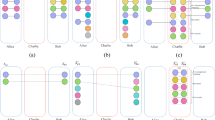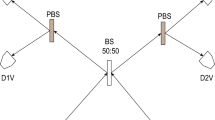Abstract
In quantum key agreement (QKA), a shared key is established among two or more parties where each participant equally contributes its part to the shared key, and none of the participants can determine the shared key alone. Zhou et al. (Electron Lett 40(18):1149, 2004) gave the first QKA protocol based on quantum teleportation and since then quite a few variants and extensions have been proposed. However, none of the existing protocols are device-independent, i.e., all of them assume implicitly that the single-photon states or entangled states supplied to the participants are of certain form. In this work, we exploit the idea of the device-independent dimension witness for independent preparation and measurement devices proposed by Tavakoli (Phys Rev Lett 125:15050, 2020) and connect it with the QKA protocol (Chong and Hwang in Opt Commun 283:1192–1195, 2010) to present the concept of semi-device-independent QKA protocol for the first time.

Similar content being viewed by others
Explore related subjects
Discover the latest articles, news and stories from top researchers in related subjects.References
Bennett, C.H., Brassard, G.: Quantum cryptography: public key distribution and coin tossing. In: Proceedings of IEEE International Conference on Computers, Systems, and Signal Processing, pp. 175–179. Bangalore (1984)
Ekert, A.K.: Quantum cryptography based on Bell’s theorem. Phys. Rev. Lett. 67(6), 661–663 (1991)
Bennett, C.H., Brassard, G., Mermin, N.D.: Quantum cryptography without Bell’s theorem. Phys. Rev. Lett. 68(5), 557–559 (1992)
Dušek, M., Haderka, O., Hendrych, M., et al.: Quantum identification system. Phys. Rev. A. 60(1), 149–156 (1999)
Shor, P.W., Preskill, J.: Simple proof of security of the BB84 quantum key distribution protocol. Phys. Rev. Lett. 85(2), 441–444 (2000)
Scarani, V., Bechmann-Pasquinucci, H., Cerf, N.J., et al.: The security of practical quantum key distribution. Rev. Mod. Phys. 81(3), 1301–1350 (2009)
Lo, H.-K., Curty, M., Qi, B.: Measurement-device-independent quantum key distribution. Phys. Rev. Lett. 108(13), 130503 (2012)
Bennett, C.H., Brassard, G., Crépeau, C., et al.: Practical quantum oblivious transfer. In: Annual International Cryptology Conference. pp. 351–366. Springer, Berlin Heidelberg (1991)
Crépeau, C.: Quantum oblivious transfer. J. Mod. Opt. 41(12), 2445–2454 (1994)
Crépeau, C., Morozov, K., Wolf, S.: Efficient unconditional oblivious transfer from almost any noisy channel. LNCS 3352, 47–59 (2005)
He, G.P., Wang, Z.D.: Oblivious transfer using quantum entanglement. Phys. Rev. A. 73(1), 012331 (2006)
Yang, Y.-G., Xu, P., Tian, J., et al.: Quantum oblivious transfer with an untrusted third party. Optik 125(18), 5409–5413 (2014)
Yang, Y.-G., Yang, R., Cao, W.-F., et al.: Flexible quantum oblivious transfer. Int. J. Theor. Phys. 56(4), 1286–1297 (2017)
Hillery, M., Bužek, V., Berthiaume, A.: Quantum secret sharing. Phys. Rev. A 59, 1829–1834 (1999)
Karlsson, A., Koashi, M., Imoto, N.: Quantum entanglement for secret sharing and secret splitting. Phys. Rev. A 59, 162–168 (1999)
Guo, G.-P., Guo, G.-C.: Quantum secret sharing without entanglement. Phys. Lett. A 310(4), 247–251 (2003)
Yang, Y.-G., Gao, S., Li, D., et al.: Three-party quantum secret sharing against collective noise. Quantum Inf. Process. 18(5), 215 (2019)
Boström, K., Felbinger, T.: Deterministic secure direct communication using entanglement. Phys. Rev. Lett. 89(18), 187902 (2002)
Deng, F.G., Long, G.L., Liu, X.S.: Two-step quantum direct communication protocol using the Einstein–Podolsky–Rosen pair block. Phys. Rev. A 68, 042317 (2003)
Deng, F.G., Long, G.L.: Secure direct communication with a quantum one-time pad. Phys. Rev. A 69, 052319 (2004)
Wang, C., Deng, F.G., Long, G.L.: Multi-step quantum secure direct communication using multi-particle Green–Horne–Zeilinger state. Opt. Commun. 253(1–3), 15–20 (2005)
Chang, Y., Xu, C.X., Zhang, S.B., et al.: Quantum secure direct communication and authentication protocol with single photons. Chin. Sci. Bull. 58(36), 4571–4576 (2013)
Zhang, W., Ding, D.S., Sheng, Y.-B., et al.: Quantum secure direct communication with quantum memory. Phys. Rev. Lett. 118, 220501 (2017)
Yang, Y.-G., Gao, S., Zhou, Y.-H., et al.: New secure quantum dialogue protocols over collective noisy channels. Int. J. Theor. Phys. 58(9), 2810–2822 (2019)
Zeng, G., Keitel, C.H.: Arbitrated quantum-signature scheme. Phys. Rev. A 65(4), 042312 (2002)
Li, Q., Chan, W.H., Long, D.Y.: Arbitrated quantum signature scheme using Bell states. Phys. Rev. A. 79(5), 054307 (2009)
Yin, X.R., Ma, W.P., Liu, W.Y.: A blind quantum signature scheme with χ-type entangled states. Int. J. Theor. Phys. 51(2), 455–461 (2012)
Yang, Y.G., Lei, H., Liu, Z.C., et al.: Arbitrated quantum signature scheme based on cluster states. Quantum Inf. Process. 15(6), 2487–2497 (2016)
Yang, Y.G., Liu, Z.C., Li, J., et al.: Theoretically extensible quantum digital signature with star-like cluster states. Quantum Inf. Process. 16(1), 1–15 (2017)
Jiang, D.-H., Xu, Y.-L., Xu, G.-B.: Arbitrary quantum signature based on local indistinguishability of orthogonal product states. Int. J. Theor. Phys. 58(3), 1036–1045 (2019)
Gao, F., Liu, B., Wen, Q.-Y.: Flexible quantum private queries based on quantum key distribution. Opt. Exp. 20, 17411–17420 (2012)
Yang, Y.-G., Sun, S.-J., Xu, P., et al.: Flexible protocol for quantum private query based on B92 protocol. Quantum Inf. Process. 13, 805–813 (2014)
Gao, F., Liu, B., Huang, W., et al.: Postprocessing of the oblivious key in quantum private query. IEEE. J. Sel. Top. Quant. 21, 6600111 (2015)
Wei, C.Y., Wang, T.Y., Gao, F.: Practical quantum private query with better performance in resisting joint-measurement attack. Phys. Rev. A 93, 042318 (2016)
Yang, Y.-G., Liu, Z.-C., Li, J., et al.: Quantum private query with perfect user privacy against a joint-measurement attack. Phys. Lett. A 380(48), 4033–4038 (2016)
Yang, Y.-G., Liu, Z.C., Chen, X.B., et al.: Novel classical post-processing for quantum key distribution-based quantum private query. Quantum Inf. Process. 15, 3833–3840 (2016)
Yang, Y.-G., Liu, Z.-C., Chen, X.-B., et al.: Robust QKD-based private database queries based on alternative sequences of single-qubit measurements. Sci. Chin. Phys. Mech. Astron. 60(12), 120311 (2017)
Yang, Y.-G., Guo, X.-P., Xu, G., et al.: Reducing the communication complexity of quantum private database queries by subtle classical post-processing with relaxed quantum ability. Comput. Secur. 81, 15–24 (2019)
Diffie, W., Hellman, M.: New directions in cryptography. IEEE Trans. Inf. Theory 22, 644–654 (1976)
Zhou, N., Zeng, G., Xiong, J.: Quantum key agreement protocol. Electron. Lett. 40(18), 1149 (2004)
Tsai, C.W., and Hwang, T.: On quantum key agreement protocol, Technical Report, CS-I-E, NCKU, Taiwan, ROC, 2009
Shi, R.H., Zhong, H.: Multi-party quantum key agreement with Bell states and Bell measurements. Quantum Inf. Process. 12, 921–932 (2013)
Shukla, C., Alam, N., Pathak, A.: Protocols of quantum key agreement solely using Bell states and Bell measurement. Quantum Inf. Process. 13, 2391–2405 (2014)
Huang, W., Wen, Q.-Y., Liu, B., et al.: Quantum key agreement with EPR pairs and single-particle measurements. Quantum Inf. Process. 13, 649–663 (2014)
Liu, W.-J., Xu, Y., Yang, C.-N., et al.: An efficient and secure arbitrary N-party quantum key agreement protocol using Bell states. Int. J. Theor. Phys. 57, 195–207 (2018)
Yang, Y.-G., Li, B.-R., Li, D., et al.: New quantum key agreement protocols based on Bell states. Quantum Inf. Process. 18(10), 322 (2019)
Chong, S.K., Hwang, T.: Quantum key agreement protocol based on BB84. Opt. Commun. 283, 1192–1195 (2010)
Liu, B., Gao, F., Huang, W., et al.: Multiparty quantum key agreement with single particles. Quantum Inf. Process. 12, 1797–1805 (2013)
Cai, B.-B., Guo, G.-D., Lin, S.: Multi-party quantum key agreement without entanglement. Int. J. Theor. Phys. 56, 1039–1051 (2017)
Shen, D.-S., Ma, W.-P., Wang, L.-L.: Two-party quantum key agreement with four-qubit cluster states. Quantum Inf. Process. 13, 2313–2324 (2014)
Xu, G.-B., Wen, Q.-Y., Gao, F., et al.: Novel multiparty quantum key agreement protocol with GHZ states. Quantum Inf. Process. 13, 2587–2594 (2014)
Sun, Z.W., Yu, J.P., Wang, P.: Efficient multi-party quantum key agreement by cluster states. Quantum Inf. Process. 15, 373–384 (2016)
He, Y.-F., Ma, W.-P.: Quantum key agreement protocols with four-qubit cluster states. Quantum Inf. Process. 14, 3483–3498 (2015)
Sun, Z.W., Zhang, C., Wang, P., et al.: Multi-party quantum key agreement by an entangled six-qubit state. Int. J. Theor. Phys. 55, 1920–1929 (2016)
Cai, T., Jiang, M., Cao, G.: Multi-party quantum key agreement with five-qubit brown states. Quantum Inf. Process. 17, 103 (2018)
Zhou, N.-R., Min, S.-Q., Chen, H.-Y., et al.: Three-party quantum key agreement protocol with seven-qubit entangled states. Int. J. Theor. Phys. 57, 3505–3513 (2018)
Yang, Y.-G., Li, B.-R., Kang, S.-Y., et al.: New quantum key agreement protocols based on cluster states. Quantum Inf. Process. 18(2), 77 (2019)
Yang, Y.-G., Gao, S., Li, D., et al.: Two-party quantum key agreement over a collective noisy channel. Quantum Inf. Process. 18(3), 74 (2019)
Zhao, X.-Q., Zhou, N.-R., Chen, H.-Y., et al.: Multiparty quantum key agreement protocol with entanglement swapping. Int. J. Theor. Phys. 58(2), 436–450 (2019)
Acin, A., Gisin, N., Masanes, L.: From Bell’s theorem to secure quantum key distribution. Phys. Rev. Lett. 97, 120405 (2006)
Xu, G.B., Jiang, D.H.: Novel methods to construct nonlocal sets of orthogonal product states in an arbitrary bipartite high-dimensional system. Quantum Inf. process. 20, 128 (2021)
Jiang, D.-H., Xu, G.-B.: Nonlocal sets of orthogonal product states in an arbitrary multipartite quantum system. Phys. Rev. A 102, 032211 (2020)
Gallego, R., Brunner, N., Hadley, C., Acin, A.: Device-independent tests of classical and quantum dimension. Phys. Rev. Lett. 105, 230501 (2010)
Pawlowski, M., Brunner, N.: Semi-device-independent security of one-way quantum key distribution. Phys. Rev. A 84, 010302(R) (2011)
Li, H.-W., Yin, Z.Q., Wu, Y.C., et al.: Semi-device-independent random-number expansion without entanglement. Phys. Rev. A 84, 034301 (2011)
Tavakoli, A.: Semi-device-independent certification of independent quantum state and measurement devices. Phys. Rev. Lett. 125, 150503 (2020)
Ivanovic, I.D.: How to differentiate between non-orthogonal states. Phys. Lett. A 123, 257 (1987)
Dieks, D.: Overlap and distinguishability of quantum states. Phys. Lett. A 126, 303 (1988)
Peres, A.: How to differentiate between non-orthogonal states. Phys. Lett. A 128, 19 (1988)
Delsarte, P., Goethals, J.M., Seidel, J.J.: Spherical codes and designs. Geom. Dedicata. 6, 363 (1977)
Benedetto, J.J., Fickus, M.: Finite normalized tight frames. Adv. Comput. Math. 18, 357 (2003)
Renes, J.M., Blume-Kohout, R., Scott, A.J., Caves, C.M.: Symmetric informationally complete quantum measurements. J. Math. Phys. 45, 2171 (2004)
Yang, Y.-G., Yang, Y.-L., Lv, X.-L., Zhou, Y.-H., Shi, W.-M.: Examining the correctness of anonymity for practical quantum networks. Phys. Rev. A 101, 062311 (2020)
Unnikrishnan, A., MacFarlane, Ian J., Yi, R., Diamanti, E., Markham, D., Kerenidis, I.: Anonymity for practical quantum networks. Phys. Rev. Lett. 122, 240501 (2019)
Acknowledgements
This work was supported by National Natural Science Foundation of China (Grant Nos. 62071015, 62171264).
Author information
Authors and Affiliations
Corresponding author
Additional information
Publisher's Note
Springer Nature remains neutral with regard to jurisdictional claims in published maps and institutional affiliations.
Rights and permissions
About this article
Cite this article
Yang, YG., Wang, YC., Li, J. et al. Semi-device-independent quantum key agreement protocol. Quantum Inf Process 20, 376 (2021). https://doi.org/10.1007/s11128-021-03317-4
Received:
Accepted:
Published:
DOI: https://doi.org/10.1007/s11128-021-03317-4




